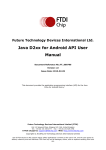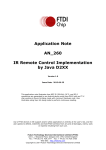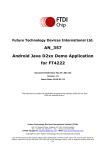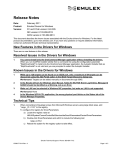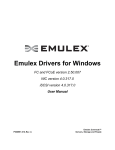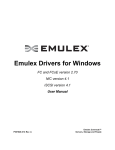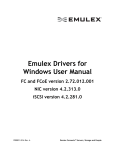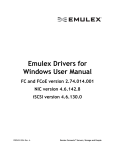Download TN 147 Java D2xx for Android
Transcript
Future Technology Devices International Ltd. Technical Note TN_147 Java D2xx for Android Document Reference No.:FT_000799 Version 1.2 Issue Date: 2013-09-16 This document describes the installation and use of the FTDI Java D2XX for Android driver for FTxxxx devices in an Android environment. Future Technology Devices International Limited (FTDI) Unit 1,2 Seaward Place, Glasgow G41 1HH, United Kingdom Tel.: +44 (0) 141 429 2777 Fax: + 44 (0) 141 429 2758 E-Mail (Support): [email protected] Web: http://www.ftdichip.com Copyright © 2013Future Technology Devices International Limited Use of FTDI devices in life support and/or safety applications is entirely at the user’s risk, and the user agrees to defend, indemnify and hold harmless FTDI from any and all damages, claims, suits or expense resulting from such use. Document Reference No.: FT_000799 TN 147 Java D2xx for Android Technical Note TN_134Version 1.2 Table of Contents 1 2 Introduction .................................................................... 2 1.1 Android Support ........................................................................ 2 1.2 Prerequisites............................................................................. 2 Using the FTDI Java D2xx for Android Library................. 3 2.1 Introduction and Usage ............................................................ 3 2.2 Application Examples ................................................................ 6 2.2.1 Information .............................................................................................. 6 2.2.2 Status ...................................................................................................... 7 2.2.3 PIDVID ..................................................................................................... 8 2.2.4 Misc ......................................................................................................... 9 2.2.5 OpenDevice ............................................................................................ 11 2.2.6 UART ..................................................................................................... 13 2.2.7 FileTransfer ............................................................................................ 14 2.2.8 EEPROM ................................................................................................. 15 2.2.9 EEPROM-UserArea ................................................................................... 16 3 Contact Information ...................................................... 17 4 Appendix A – References............................................... 18 Acronyms and Abbreviations ........................................................... 18 5 Appendix B – List of Tables & Figures ........................... 19 6 Appendix C– Revision History........................................ 20 Copyright © 2013Future Technology Devices International Limited 1 Document Reference No.: FT_000799 TN 147 Java D2xx for Android Technical Note TN_134Version 1.2 1 Introduction FTDI provides a proprietary D2XX interface for easy communication with FTxxxx devices. The D2XX API is common across several operating systems supported by FTDI, namely Windows, Windows CE, Linux, Mac OS X and Android. 1.1 Android Support To support the Google Android OS, FTDI has two D2XX solutions for different application scenarios: 1. A Java class using the JNI (Java Native Interface) to access the API of a pre-compiled Linux D2XX library. This solution is applicable to all versions of Android, but requires special root privilege on USB-related device nodes. This is for reusing existing Linux designs in Android applications or creating projects for Android OS predating version 3.2. 2. A Java class library supporting USB Host is available and applicable to Android v3.2or any later series. This library requires no special root access privileges. The first solution is described in TN_134 FTDI Android D2XX Driver. This document describes the second solution which can be easily adapted by Android application developers, i.e. the Java D2xx API for Android. The API is packaged in d2xx.jar and is distributed with demo application source code, which can be downloaded from FTDI’s website. 1.2 Prerequisites The following is required to install the FTDI Java D2xx for Android driver: An Android device running v3.2 or later OS, with a USB Host or OTG interface; An FTDI-based device for testing. o FTDI testing was conducted using a Google Nexus 7, and an FT232R-based US232R cable. To develop an application using the FTDI Java D2XX for Android driver, the development machine needs the Eclipse IDE and an up-to-date Android SDK, including the ADB program and the ADT plug-in for Eclipse. Installation and configuration of these tools is not described in this document but is outlined on the Android developer web site. Please see (http://developer.android.com/sdk/index.html). Also, the Android device should have USB Debugging enabled to allow access using the ADB utility. To accomplish this, navigate to Settings > Applications > Development and select the USB debugging option. A summary of the required configuration is provided in the diagram below. Development Machine Eclipse IDE with ADT Plugin Android SDK Android ADB Utility Android Device ADB Connection over USB USB Host Capability USB Debugging Enabled Wi-Fi/LAN Enabled Figure 1: Android Development Configuration Copyright © 2013Future Technology Devices International Limited 2 Document Reference No.: FT_000799 TN 147 Java D2xx for Android Technical Note TN_134Version 1.2 2 Using the FTDI Java D2xx for Android Library 2.1 Introduction and Usage To support versatile tablet usage scenarios, Google has included a USB Host API in Android since version 3.1. Before version 3.1, an Android application could not access USB devices attached to a system naturally without root access rights. The Android USB Host API removes this limitation, allowing us to utilize the USB gadgets attached to Android Host or OTG port. FTDI provides a Java class library that adapts to applications so the developer can focus on the desired input and output data. The design goal of the class library is to provide access to all the D2XX functions including, EEPROM functions. The D2xx library can be included in an Android application project in Eclipse easily. First, copy the library file, d2xx.jar, to the folder of the project, and add it in “Project”–“Properties”. Refer to Figure 2 ~ Figure 4, which show how to add the library file from the “\libs” sub-folder of the project folder. Figure 2: Select “Project” – “Properties” Copyright © 2013Future Technology Devices International Limited 3 Document Reference No.: FT_000799 TN 147 Java D2xx for Android Technical Note TN_134Version 1.2 Figure 3: Select “Java Build Path” – “Libraries” – “Add JARs” Figure 4: Select the library file – d2xx.jar Copyright © 2013Future Technology Devices International Limited 4 Document Reference No.: FT_000799 TN 147 Java D2xx for Android Technical Note TN_134Version 1.2 The D2xxManager class allows access to driver-wide information such as the VID and PID combinations to match with the device information list, and provides APIs to open target devices returning corresponding FT_Device objects. The FT_Device object can perform UART, EEPROM, and Bit moderelated operations to control device status or read/write data. When the device is no longer required, the FT_Device object can be closed with the close() method. The D2xx Java library is fully documented using Javadoc. For information on the D2xx Android library methods, constants and sub-classes, please consult the corresponding Javadoc entry in the sample project’s /doc directory. A sample application demonstrating how to use various methods in the D2xx Java library is shown in section 2.2 Application Examples. Please refer to “AN_233 Java D2xx for Android API User Manual” for the detail of the demo APIs. Copyright © 2013Future Technology Devices International Limited 5 Document Reference No.: FT_000799 TN 147 Java D2xx for Android Technical Note TN_134Version 1.2 2.2 Application Examples 2.2.1 Information Figure 5: Demo Application Screenshot – Information This demo application contains a Refresh button. Tap Refresh to access information about the connected device. In this demo, these APIs are used: Class API Name D2xxManager D2xxManager D2xxManager createDeviceInfoList getDeviceInfoList getLibraryVersion Note: In later demo applications, duplicated APIs are not listed again. Copyright © 2013Future Technology Devices International Limited 6 Document Reference No.: FT_000799 TN 147 Java D2xx for Android Technical Note TN_134Version 1.2 2.2.2 Status Figure 6: Demo Application Screenshot – Status This demo application contains Start API Test, Test Set Char and Test Set Break buttons. Tap Start API Test to call several APIs to obtain the related information. Test Set Char and Test Set Break buttons will show the test results on the buttons directly – appended with Pass or Fail– when they are tapped. Copyright © 2013Future Technology Devices International Limited 7 Document Reference No.: FT_000799 TN 147 Java D2xx for Android Technical Note TN_134Version 1.2 In this demo, these APIs are used: Class API Name FT_Device FT_Device FT_Device FT_Device FT_Device FT_Device FT_Device FT_Device getDeviceInfo getLatencyTimer getLineStatus getModemStatus setBitMode setBreakOff setBreakOn setChars 2.2.3 PIDVID Figure 7: Demo Application Screenshot – PIDVID This demo application contains two buttons – Set PID VID and Get PID VID. Get PIDVID lists all the devices (in terms of Product and Vendor IDs) that would be recognised and supported by D2XX. To specify an additional device, enter the corresponding Product and Vendor ID, then tap Set PIDVID. In this demo, these APIs are used: Class API Name D2xxManager D2xxManager getVIDPID setVIDPID Copyright © 2013Future Technology Devices International Limited 8 Document Reference No.: FT_000799 TN 147 Java D2xx for Android Technical Note TN_134Version 1.2 2.2.4 Misc Figure 8: Demo Application Screenshot – Misc This demo application contains: 1. Loopback demo: There is a Loopback Test button and an input area for Write Data. To run this test, you must connect an RS232 ‘loop-back’ device, which has pairs of pins connected together (Rx to Tx, RTS to CTS and DSR to DTR). Enter some words in the Write Data area and tap Loopback Test. appear in the Read Data area. Shortly, the same data should 1. Event demo: Tap Enable Set Event to set event notification which waits RX event, and then redo the actions in loopback demo. When there is some data sent and received, the event would be triggered. The test results are displayed in the Test Info area. 1. DTR/RTS Enable/Disable Demo: The 2 functions, Disable DTR and Disable RTS are for disabling/enabling DTR and RTS. The test results are displayed in the Test Info area. Copyright © 2013Future Technology Devices International Limited 9 Document Reference No.: FT_000799 TN 147 Java D2xx for Android Technical Note TN_134Version 1.2 In this demo, these APIs are used: Class API Name FT_Device FT_Device FT_Device FT_Device FT_Device FT_Device FT_Device FT_Device FT_Device clrDtr clrRts getEventStatus getQueueStatus read(*1) setDtr setEventNotification setRts write(*2) Note: *1 : read without length parameter *2 : write without length parameter Copyright © 2013Future Technology Devices International Limited 10 Document Reference No.: FT_000799 TN 147 Java D2xx for Android Technical Note TN_134Version 1.2 2.2.5 OpenDevice Figure 9: Demo Application Screenshot – OpenDevice This demo application shows different ways to open the device. Select Open Device and Open Device with Setting Parameter to test the open-related APIs. When BufferNumber, BufferSize, TransferSize or ReadTimeout is not set, the device uses the default value to open the device. Get Parameter: gets current parameters. Copyright © 2013Future Technology Devices International Limited 11 Document Reference No.: FT_000799 TN 147 Java D2xx for Android Technical Note TN_134Version 1.2 About Open By USBDevice, when Android detects an USB device is plugged-in, it will send out a broadcast containing a UsbDevice object corresponding to the just attached device to notify interested party; when this application receive the notification, it will automatically call openByUsbDevice()to open the just attached device with the UsbDevice object provided by that notification. Use “Reset” to clear the memory after the demo. In this demo, these APIs are used: Class API Name D2xxManager D2xxManager D2xxManager D2xxManager D2xxManager D2xxManager D2xxManager D2xxManager D2xxManager D2xxManager D2xxManager D2xxManager D2xxManager.DriverParameters D2xxManager.DriverParameters D2xxManager.DriverParameters D2xxManager.DriverParameters FT_Device D2xxManager.DriverParameters D2xxManager.DriverParameters D2xxManager.DriverParameters D2xxManager.DriverParameters getDeviceInfoListDetail isFtDevice openByDescription openByDescription(*) openByIndex openByIndex(*) openByLocation openByLocation(*) openBySerialNumber openBySerialNumber(*) openByUsbDevice openByUsbDevice(*) getBufferNumber getMaxBufferSize getMaxTransferSize getReadTimeout resetDevice setBufferNumber setMaxBufferSize setMaxTransferSize setReadTimeout Note: * : this function open device with D2xxManager.DriverParameters parameter Copyright © 2013Future Technology Devices International Limited 12 Document Reference No.: FT_000799 TN 147 Java D2xx for Android Technical Note TN_134Version 1.2 2.2.6 UART Figure 10: Demo Application Screenshot – UART This demo application displays the functionality of UART. The first row contains an Open button to open selected Port numbers and a Config button to set UART configuration with several selectable setting items. The UART configuration settings allow the baud rate to be set at standard values between 300 and 921600 baud. Stop bits may be set for 1 or 2. Data bits may be set for 7 or 8. Parity may be set for ODD, EVEN, Mark, Space, None. Flow allows for no flow control, RTS/CTS, DTR/DSR and XOFF/XON flow control. The Read Bytes box displays the received data as ASCII values. The Read Enabled button is used to test stop/restart IN task APIs. Read Enabled will switch to Read Disabled when tapped, causing the application to stop receiving data. Tap it again to enable the receive functionality. Write Bytes allows a user to type in plain text and send it by tapping Write. This application receives and sends data from and to the PC; or the Android device itself if a ‘loop-back’ device is connected. Copyright © 2013Future Technology Devices International Limited 13 Document Reference No.: FT_000799 TN 147 Java D2xx for Android Technical Note TN_134Version 1.2 In this demo, these APIs are used: Class API Name FT_Device FT_Device FT_Device FT_Device FT_Device FT_Device FT_Device FT_Device FT_Device FT_Device FT_Device close isOpen purge read(*1) restartInTask setBaudRate setDataCharacteristics setFlowControl setLatencyTimer stopInTask write(*2) Note: *1: read with length parameter *2: write with length parameter 2.2.7 FileTransfer Figure 11: Demo Application Screenshot – FileTransfer This demo application displays the functionality of UART, but it could receive or send a file. It also opens the device of index 0, the UART configuration is the same as UART demo introduced in previous section. Copyright © 2013Future Technology Devices International Limited 14 Document Reference No.: FT_000799 TN 147 Java D2xx for Android Technical Note TN_134Version 1.2 To use this application, please follow the steps below: Step 1: Setup the connection between device and PC. Step 2: Configure desired UART parameters. Step 3: Tap the Start Getting Data button on the Android, then use a PC terminal to emulate sending a text file to the Android in raw mode, i.e., send all text data as it is, without extra encoding by X/Y/Z-modem protocol. Step 4: After the file is sent, tap Start Getting Data again to stop receiving the file. Step 5: Now on the PC terminal, prepare to receive a text file from Android. Step 6: Tap the Send Saved File button on the Android. The data stored during Steps 3~4 will now be received by the PC. Step 7: Now compare whether the sent and received files are the same. The Status area will show some information during the get data and send file process. 2.2.8 EEPROM Figure 12: Demo Application Screenshot – EEPROM WARNING: Backup the test device’s EEPROM data(using FT_Prog) before performing the Write or Erase functions. Erasing the EEPROM might cause some devices to stop functioning. (FT_Prog: http://www.ftdichip.com/Support/Utilities.htm#FT_Prog) This demo application contains Read EEPROM, Write EEPROM and Erase EEPROM buttons. Tap Read EEPROM to get and parse some data of the connected device. Click Write EEPROM to write data back to EEPROM. This demo is limited to modifying the content of Product Description, Serial Number and Data(3A)~Data(3D). Erase EEPROM erases the entire EEPROM. Copyright © 2013Future Technology Devices International Limited 15 Document Reference No.: FT_000799 TN 147 Java D2xx for Android Technical Note TN_134Version 1.2 In this demo, these APIs are used: Class API Name FT_Device FT_Device FT_Device FT_Device FT_Device eepromErase eepromRead eepromReadWord eepromWrite eepromWriteWord 2.2.9 EEPROM-UserArea Figure 13: Demo Application Screenshot – EEPROM-UserArea This demo application accesses the EEPROM user area. Click Read EEPROM to get User Area Size and list the contents of user area. Write EEPROM writes fixed data: 0, 1, 2, 3, 4, etc. to the entire user area. Erase EEPROM writes fixed data: 0 to the entire user area. NOTE: Please remember to backup EEPROM data(using FT_Prog) before writing or erasing. In this demo, these APIs are used: Class API Name FT_Device FT_Device FT_Device eepromGetUserAreaSize eepromReadUserArea eepromWriteUserArea Copyright © 2013Future Technology Devices International Limited 16 Document Reference No.: FT_000799 TN 147 Java D2xx for Android Technical Note TN_134Version 1.2 3 Contact Information Head Office – Glasgow, UK Branch Office – Tigard, Oregon, USA Future Technology Devices International Limited Unit 1,2 Seaward Place, Centurion Business Park Glasgow G411HH United Kingdom Tel: +44 (0) 141 429 2777 Fax: +44 (0) 141 429 2758 Future Technology Devices International Limited (USA) 7130 SW Fir Loop Tigard, OR 97223-8160 USA Tel: +1 (503) 547 0988 Fax: +1 (503) 547 0987 E-mail (Sales) E-mail (Support) E-mail (General Enquiries) Web Site URL Web Shop URL [email protected] [email protected] [email protected] http://www.ftdichip.com http://www.ftdichip.com E-Mail (Sales) E-Mail (Support) E-Mail (General Enquiries) Web Site URL [email protected] [email protected] [email protected] http://www.ftdichip.com Branch Office – Shanghai, China Branch Office – Taipei, Taiwan Future Technology Devices International Limited (Taiwan) 2F, No. 516, Sec. 1, NeiHu Road Taipei 114 Taiwan, R.O.C. Tel: +886 (0) 2 8797 1330 Fax: +886 (0) 2 8751 9737 E-mail (Sales) E-mail (Support) E-mail (General Enquiries) Web Site URL [email protected] [email protected] [email protected] Future Technology Devices International Limited (China) Room 1103, No. 666 West Huaihai Road, Shanghai, 200052 China Tel: +86 2162351596 Fax: +86 2162351595 E-mail (Sales) E-mail (Support) E-mail (General Enquiries) Web Site URL [email protected] [email protected] [email protected] http://www.ftdichip.com http://www.ftdichip.com Distributor and Sales Representatives Please visit the Sales Network page of the FTDI Web site for the contact details of our distributor(s) and sales representative(s) in your country. System and equipment manufacturers and designers are responsible to ensure that their systems, and any Future Technology Devices International Ltd (FTDI) devices incorporated in their systems, meet all applicable safety, regulatory and system-level performance requirements. All application-related information in this document (including application descriptions, suggested FTDI devices and other materials) is provided for reference only. While FTDI has taken care to assure it is accurate, this information is subject to customer confirmation, and FTDI disclaims all liability for system designs and for any applications assistance provided by FTDI. Use of FTDI devices in life support and/or safety applications is entirely at the user’s risk, and the user agrees to defend, indemnify a nd hold harmless FTDI from any and all damages, claims, suits or expense resulting from such use. This document is subject to change without notice. No freedom to use patents or other intellectual property rights is implied by the publication of this document. Neither the whole nor any part of the information contained in, or the product described in this document, may be adapted or reproduced in any material or electronic form without the prior written consent of the copyright holder. Future Technology Devices International Ltd, Un it 1, 2 Seaward Place, Centurion Business Park, Glasgow G41 1HH, United Kingdom. Scotland Registered Company Number: SC136640 Copyright © 2013Future Technology Devices International Limited 17 Document Reference No.: FT_000799 TN 147 Java D2xx for Android Technical Note TN_134Version 1.2 4 Appendix A – References http://developer.android.com http://code.google.com/p/rowboat/wiki/JellybeanOnBeagleboard_WithSGX http://beagleboard.org/hardware-xM http://www.ubuntu.com/ Acronyms and Abbreviations Terms Description ADB Android Debug Bridge ADT Android Development Tools AOSP Android Open Source Project API Application Programming Interface BSP Board Support Package CTS Clear To Send DSR Data Set Ready DTR Data Terminal Ready EEPROM Electrically Erasable Programmable Read-Only Memory IDE Integrated Development Environment JNI Java Native Interface NDK Native Development Kit OS Operating System PID Product ID RTS Request To Send SDK Software Development Kit UART Universal Asynchronous Receiver/Transmitter USB Universal Serial Bus VID Vendor ID Copyright © 2013Future Technology Devices International Limited 18 Document Reference No.: FT_000799 TN 147 Java D2xx for Android Technical Note TN_134Version 1.2 5 Appendix B – List of Tables & Figures List of Figures Figure 1: Android Development Configuration ............................................................ 2 Figure 2: Select “Project” – “Properties” .................................................................... 3 Figure 3: Select “Java Build Path” – “Libraries” – “Add JARs” .................................... 4 Figure 4: Select the library file – d2xx.jar .................................................................. 4 Figure 5: Demo Application Screenshot – Information ............................................... 6 Figure 6: Demo Application Screenshot – Status ........................................................ 7 Figure 7: Demo Application Screenshot – PIDVID ...................................................... 8 Figure 8: Demo Application Screenshot – Misc ........................................................... 9 Figure 9: Demo Application Screenshot – OpenDevice .............................................. 11 Figure 10: Demo Application Screenshot – UART ...................................................... 13 Figure 11: Demo Application Screenshot – FileTransfer ........................................... 14 Figure 12: Demo Application Screenshot – EEPROM ................................................. 15 Figure 13: Demo Application Screenshot – EEPROM-UserArea ................................. 16 Copyright © 2013Future Technology Devices International Limited 19 Document Reference No.: FT_000799 TN 147 Java D2xx for Android Technical Note TN_134Version 1.2 6 Appendix C– Revision History Revision Changes Date 1.0 Initial Release for beta test 2013-01-24 1.1 First Public release 2013-02-05 1.2 Update to section 2.2.2 2013-09-16 Copyright © 2013Future Technology Devices International Limited 20





















